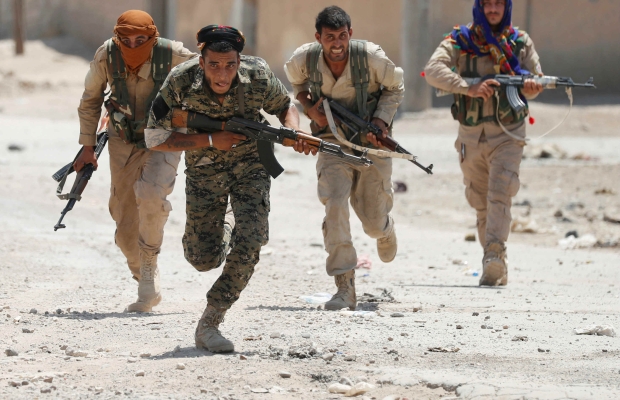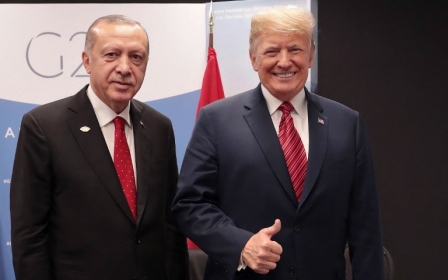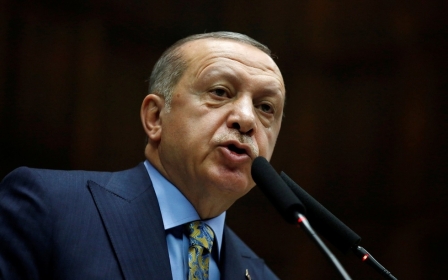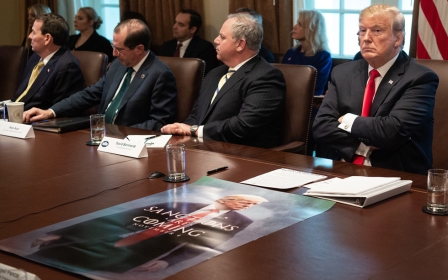Under pressure, Trump sought assurances from Erdogan on fate of Syrian Kurds
ISTANBUL, Turkey - Donald Trump specifically sought assurances from Recep Tayyip Erdogan about the fate of Washington's Kurdish allies in Syria in a phone call last month, only a few days after the White House announced the withdrawal of US troops from the war-torn country, according to a source familiar with the conversation.
The US president and his Turkish counterpart spoke on 23 December, the source told Middle East Eye on condition of anonymity.
The source said Trump was seeking a pledge from Erdogan that a possible Turkish military operation against Kurdish forces belonging to the People's Protection Units (YPG) militia in Syria wouldn't lead to a humanitarian crisis or destabilise the region.
The call came in response to growing political pressure on Trump, as US lawmakers and media commentators accused the president of abandoning Kurdish fighters in Syria, whom they credit with defeating the Islamic State (IS) group.
Only a few days earlier, on 19 December, Trump announced the withdrawal of about 2,000 US troops from Syria, where they have provided support to Kurdish-led forces in the fight against IS.
“I’m under pressure,” Trump said in the phone call with Erdogan, according to the source.
Erdogan responded by telling Trump that Turkey had no quarrels with Syrian Kurds per se and was providing refuge for more than 300,000 Syrian-Kurdish displaced people, the source said.
A source in Washington, also speaking on condition of anonymity, told MEE that Erdogan also reiterated that the YPG is a direct offshoot of the Kurdistan Workers' Party (PKK), a Kurdish separatist group that both Washington and Ankara regard as a terrorist organisation.
Turkey has legitimate national security reasons to go after the YPG, Erdogan also told Trump, according to the Washington source.
Contacted by MEE, a White House spokesman did not comment directly on the contents of the conversation.
In an interview with Newsmax set to air on Thursday evening, US Secretary of State Mike Pompeo confirmed Washington's concern over a possible Turkish offensive against Kurdish forces.
Pompeo said Trump's aides are working to meet all the Syria objectives the president laid out, including "ensuring that the Turks don’t slaughter the Kurds" and the protection of religious minorities, according to a transcript released by the State Department.
Coordination in Syria
During the 23 December call, the two leaders agreed to work together to fight IS and coordinate their moves inside Syria.
“We discussed ISIS, our mutual involvement in Syria, & the slow & highly coordinated pullout of US troops from the area. After many years they are coming home,” Trump tweeted after the call.
A few days later, US National Security Adviser John Bolton said on Twitter that he would visit Turkey and Israel in relation to the US withdrawal from Syria.
General Joseph Dunford, chairman of the Joint Chiefs of Staff, and Ambassador James Jeffrey, the US Secretary of State’s Special Representative for Syria Engagement, will also accompany Bolton on his trip to Ankara, which is set for 8 January, according to National Security Council Spokesman Garrett Marquis.
“We cannot plan anything in Syria without knowing the details of their roadmap,” a Turkish official told Middle East Eye, speaking on condition of anonymity due to government protocol.
For their part, US officials would like to see Turkish plans to take the lead in the fight against IS in northeastern Syria, according to another Washington source who was briefed about the visit.
“They would like to talk about the Iranian threat in the country and what [the] Turks could do about it," the source said.
Uncertainty persists
Trump has made several public statements since his announcement last month that have created confusion around his pledge to pull American troops out of Syria.
On 31 December, he appeared to hit the brakes on his promise, saying his administration was "slowly sending our troops back home". Still, he didn't go into specifics about when the withdrawal would be completed.
On Wednesday, Trump reiterated that he wants to protect “the Kurds” in Syria, another ambiguous statement that may open the door for the Pentagon to drag its feet on the pullout.
In response, Turkish officials have been careful not to commit to any plans that could lead to unexpected results in Syria.
The “US Central Command is trying to water down the withdrawal plans. Honestly it is good for us, since we don’t want a rapid pullout, which could endanger us,” the Turkish official said.
Despite the confusion over the timeframe of the withdrawal, sources in Ankara told MEE that Turkey and the US were making progress in other areas.
On Thursday, a delegation of US diplomatic and military officials visited Turkey to hold routine bilateral meetings.
US Central Command is trying to water down the withdrawal plans. Honestly it is good for us, since we don’t want a rapid pullout, which could endanger us
- Turkish official
The delegation was specifically evaluating Turkey's extradition requests for some of the followers of Pennsylvania-based Turkish cleric Fethullah Gulen.
Turkish courts brought several charges against Gulen for his alleged complicity in the coup attempt in Turkey in 2016, and Turkish officials say Washington is keen to investigate some parts of the allegations, including financial crimes.
Ankara submitted several documents to the US authorities, allegedly proving that followers of Gulen carried out illicit money transfers.
“There is a momentum in these cases. They are getting serious about them,” a Turkish diplomat said.
Turkish media reported that the delegation, which included FBI agents, interviewed detained Gulenist suspects via video conference at the Ankara provincial courthouse.
One of the leading suspects was Kemal Batmaz, a civilian who was detained at the airbase the putschists used as a headquarters on the day of the failed coup in 2016.
Turkish officials say Batmaz accompanied alleged coup leader Adil Oksuz on a trip to the US two days before the coup attempt, allegedly to bring plans back to Turkey.
US officials previously told journalists that the current Turkish files against Gulen didn’t contain enough evidence to seek extradition in court.
As a result, the case remains at a stalemate and serves as an ongoing point of tension between Washington and Ankara.
Gulen has repeatedly denied having anything to do with the coup attempt.
New MEE newsletter: Jerusalem Dispatch
Sign up to get the latest insights and analysis on Israel-Palestine, alongside Turkey Unpacked and other MEE newsletters
Middle East Eye delivers independent and unrivalled coverage and analysis of the Middle East, North Africa and beyond. To learn more about republishing this content and the associated fees, please fill out this form. More about MEE can be found here.





